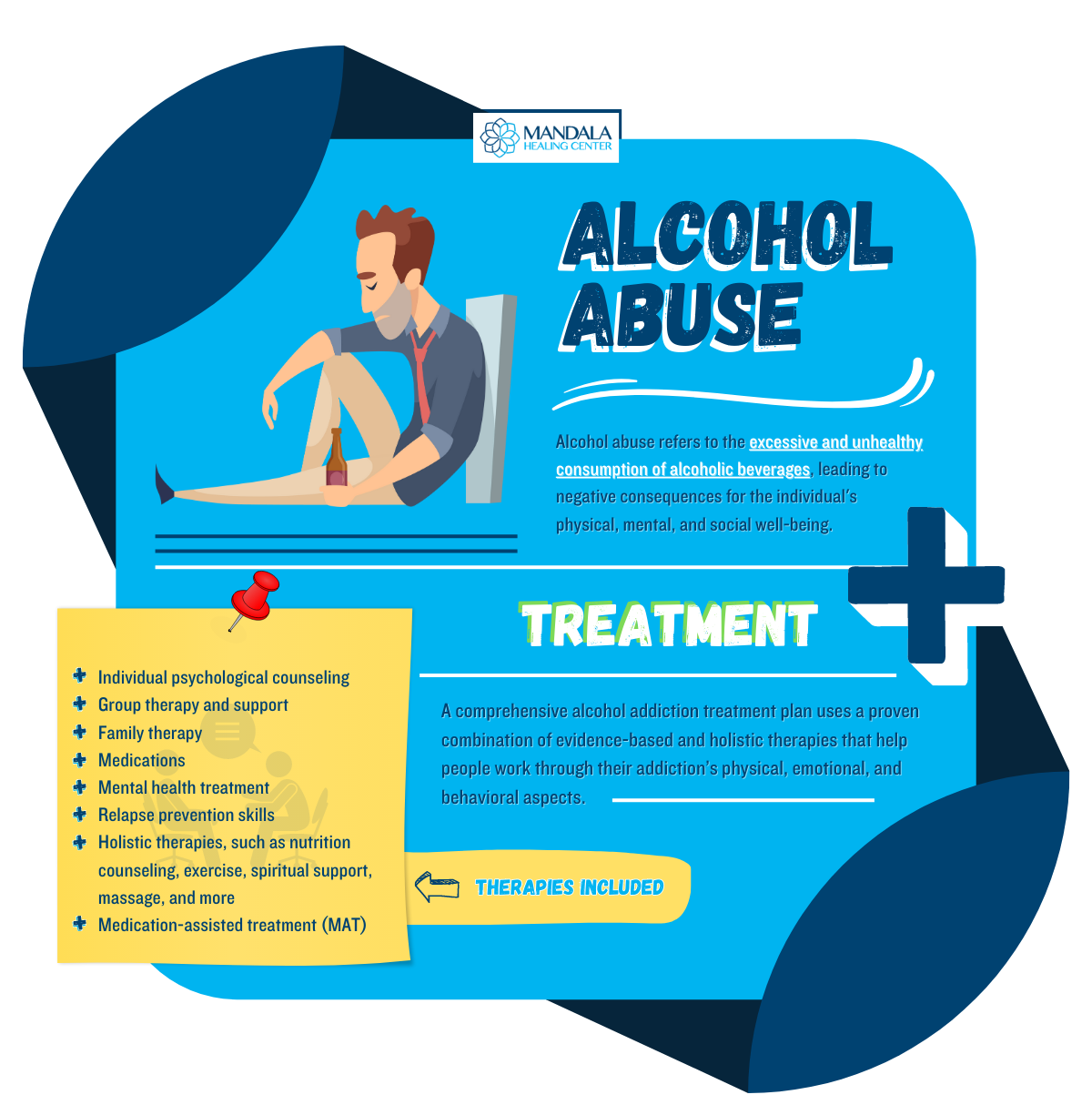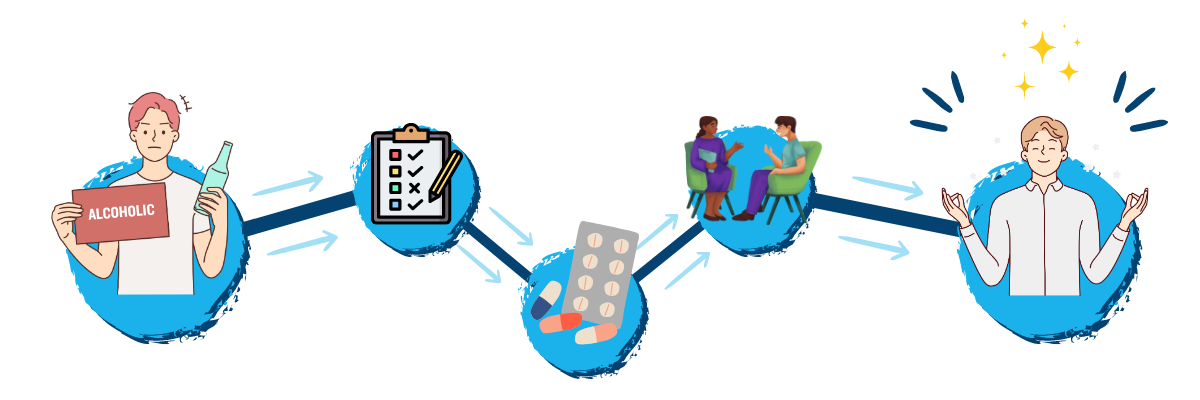Alcohol Abuse, Addiction, and Treatment
Alcohol use is common in the culture of the United States. Many social gatherings and celebrations include alcohol, and most American adults drink from time to time. In fact, alcohol is so common that the 2021 National Survey on Drug Use and Health (NSDUH) found that 133.1 million people ages 12 and older (more than 47%) drank alcohol in the last month and 16.2 million adults aged 18 and older reported heavy alcohol use in the last month.[1]
Regular alcohol abuse can be harmful to your physical and mental health. It can also lead to alcohol addiction or alcoholism. The 2021 NSDUH found that nearly 29.5 million people aged 12 and older had an alcohol use disorder that year.
If you or a loved one requires treatment for alcohol addiction, knowing what to expect during treatment can be helpful. Here, you’ll discover what happens at each stage of alcohol addiction treatment.
Alcohol Addiction: Signs and Symptoms
Some people develop an unhealthy pattern of drinking that can lead to dependence or addiction. Recognizing the signs of alcohol addiction may be the first step toward getting treatment to overcome it.
Some of the signs of alcohol addiction include:
- Being unable to control the amount of alcohol you drink
- Wanting to stop drinking or drink less but being unable to do so
- Spending a lot of time and energy getting alcohol, drinking, or recovering from drinking
- Experiencing cravings or urges to drink alcohol
- Neglecting your responsibilities at home, work, or school because of drinking
- Isolating or drawing away from relationships and hobbies due to alcohol use
- Engaging in risky behaviors while drinking, such as driving under the influence
- Needing to drink more to get the desired effects of alcohol or being able to drink a lot without experiencing its effects
- Experiencing withdrawal symptoms if you stop drinking
- Drinking to avoid or stop withdrawal symptoms
These physical and behavioral symptoms could mean you need treatment and support to stop drinking safely and avoid relapse.
How Much Alcohol is Too Much?
The Centers for Disease Control and Prevention recommend that people who choose to drink alcohol do so in moderation. Moderate drinking is defined as:[2]
- One or fewer alcoholic drinks per day for women
- Two or fewer alcoholic drinks per day for men
A “drink” is defined as:
- 12 ounces of beer
- 5 ounces of wine
- 8 ounces of malt liquor
- 1.5 ounces of distilled spirits
It is important to note that a standard drink served in a bar or restaurant may contain several servings of alcohol as defined by the CDC. For example, a standard pint of beer (16 ounces) would contain 1 ⅓ “drinks” under these guidelines.
Heavy drinking is associated with several adverse health outcomes, including an increased risk of accidents and injuries, certain types of cancer, and heart disease. The CDC defines heavy drinking as a pattern of alcohol consumption that exceeds the recommended guidelines, meaning:
- Having 8 or more alcoholic drinks weekly for women
- Drinking 15 or more alcoholic drinks weekly for men
Drinking heavily can cause your body to develop tolerance and dependence, which are warning signs for alcohol addiction.
Alcohol Addiction Treatment
Alcohol addiction treatment occurs in stages. The amount of time a person spends in treatment depends on the severity of their alcoholism, mental and physical health, and other aspects of their health.
Assessment
A medical or addiction specialist will first evaluate your needs by performing an assessment. The evaluation will consist of questions about your alcohol consumption, other substances you use, and your history of addiction treatment. The assessment may also include a physical exam, mental health evaluation, and lab or imaging tests. This information will help your treatment team create the most effective treatment plan for you.
Detox
Medically-supported detox is often necessary to help people manage withdrawal symptoms and minimize risk. Alcohol detox programs generally last 2 to 7 days, depending on a person’s needs. Treatment includes medications to address the physical and psychological symptoms of alcohol withdrawal, emotional support, and holistic therapies for comfort.
It’s important to note that it is never safe to detox from alcohol without medical supervision. Alcohol withdrawal can result in severe and potentially life-threatening symptoms, including:
- Anxiety, nervousness, and irritability
- Insomnia or difficulty sleeping
- Tremors or shaking, especially in the hands
- Headache, nausea, and vomiting
- Sweating and rapid heart rate
- Hallucinations, which can be auditory or visual
- Seizures, in severe cases
- Delirium tremens (DTs), which is a serious and potentially life-threatening condition characterized by severe confusion, fever, and seizures
Alcohol detox centers can prescribe long-acting benzodiazepines, such as diazepam (Valium), which affect the same receptors in the brain as alcohol does, thereby reducing withdrawal symptoms. The dose of Valium you are given will be gradually decreased every day as your symptoms resolve. A Valium taper can prevent seizures and other severe withdrawal symptoms.
Alcohol Addiction Treatment
A comprehensive alcohol addiction treatment plan uses a proven combination of evidence-based and holistic therapies that help people work through their addiction’s physical, emotional, and behavioral aspects. These therapies include:[3]
- Individual psychological counseling
- Group therapy and support
- Family therapy
- Medications
- Mental health treatment
- Relapse prevention skills
- Holistic therapies, such as nutrition counseling, exercise, spiritual support, massage, and more
- Medication-assisted treatment (MAT) – medications like naltrexone (Vivitrol) can be useful for treating alcohol cravings.
Alcoholism treatment is not one-size-fits-all. Treatment teams must tailor treatment plans to meet each person’s unique needs and adjust plans as they change during recovery.
After completing an alcohol rehab program, it’s crucial to create and follow an aftercare plan that includes activities that support lifelong recovery. Your aftercare plan may consist of continuing individual therapy, attending 12-step or support group meetings, and staying on track with your medical appointments and treatment.
Levels of Care in Alcohol Rehab
Alcohol addiction treatment is offered in several levels of care to accommodate a wide range of needs. These include:
Outpatient treatment
People receive treatment on an outpatient basis, generally attending treatment sessions several times per week. Treatment sessions often occur in the evening to accommodate going to work and school. Intensive outpatient programs (IOPs) meet more often and require several hours per day devoted to treatment activities. This flexible alcoholism treatment option is best for people who have completed other, more intensive treatment programs, are motivated to attend treatment and have safe, stable housing.
Residential/inpatient treatment
Residential treatment programs offer intensive alcohol addiction treatment programs in a safe, secure environment and provide 24/7 care to patients with severe alcohol use disorders. Patients live in the treatment facility while undergoing treatment and work with licensed counselors, medical providers, and addiction specialists for several hours each day.
Start Alcoholism Addiction Treatment in West Palm Beach, FL Today
At Mandala Healing Center, we inspire healing in our patients through compassionate care. Going beyond the conventional approach of alcohol detoxification, patients at our facility are inspired to fully heal in an environment designed to nourish their entire being.
Clients are taken on a journey of healing through complete immersion into evidence-based clinical modalities, multifaceted alternative therapies, and expert medical management, allowing them to fully detox and recover from alcoholism. Through a program of care designed to encourage change, a foundation is created that allows clients to find their higher purpose and reclaim their lives.
If you or a loved one are suffering from alcoholism or would like to learn more about your alcohol rehab options, please reach out to our dedicated admissions counselors today.
References:
1. National Institute on Alcohol Abuse and Alcoholism (NIAAA): Alcohol’s Effects on Health, Retrieved April 2023 from https://www.niaaa.nih.gov/alcohols-effects-health/alcohol-topics/
2. Centers for Disease Control and Prevention (CDC): Alcohol and Public Health, Retrieved April 2023 from https://www.cdc.gov/alcohol/fact-sheets.htm
3. National Library of Medicine: Alcohol Withdrawal, Retrieved April 2023 from https://www.ncbi.nlm.nih.gov/books/NBK441882/



